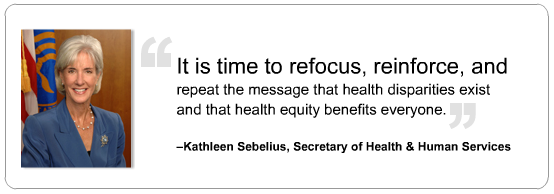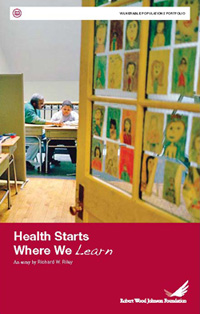Social Determinants of Health
 |
|---|
The World Health Organization (WHO) notes that social determinants of health are "the conditions in which people are born, grow, live, work and age" that can contribute to or detract from the health of individuals and communities. Marked differences in social determinants, such as poverty, low socioeconomic status (SES), and lack of access to care, exit along racial and ethnic lines. These differences can contribute to poor health outcomes (from the HHS Action Plan to Reduce Racial and Ethnic Health Disparities, p. 2).
CDC Health Impact Pyramid
The CDC Health Impact Pyramid, created by Dr. Thomas Frieden, Director of the Centers for Disease Control and former Commissioner of the NYC Health Dept., is a five-tier pyramid that best describes the impact of different types of public health interventions and provides a framework to improve health.
|
CDC Health Impact Pyramid
|
At the base of this pyramid, indicating interventions with the greatest potential impact, are efforts to address socioeconomic determinants of health such as poverty, education, housing, and inequality. In ascending order are interventions that change the context to make individuals' default decisions healthy, such as fluoridation of our water, elimination of transfats in our diets and our restaurants, policies and laws that facilitate smoke-free environments, and taxing harmful substances, such as tobacco, alcohol, and sugar-sweetened beverages.
Clinical interventions that require limited contact but confer long-term protection include immunizations, brief or sporadic interventions, as well as treatments such as smoking cessation programs.
Ongoing direct clinical care such as treatment for hypertension, high cholesterol, diabetes, and heart disease may demonstrate a smaller impact over the long haul, as well as health education and counseling, in which people are taught to eat healthy and increase their levels of physical activity.
Interventions focusing on lower levels of the pyramid tend to be more effective because they reach broader segments of society and require less individual effort. Implementing interventions at each of the levels can achieve the maximum possible sustained public health benefit.
The Impact of Where We Live
The essays below from the Robert Wood Johnson Foundation offer further evidence of the impact of social determinants on health outcomes.
|
Health Starts Where We Live, Learn, Work and Play |
|
 Health Starts Where We Learn |
|
 Health Starts Where We Work |
 Health Starts Where We Play |
"Health Starts Where We Live, Learn, Work and Play" from www.rwjf.org/pr/product.jsp?id=70928
Community-Based Interventions
This video by the Boston Public Health Commission's Center for Equity and Social Justice highlightis the work of three grantees from their community-based strategies for eliminating racial and ethnic health inequities program.
|
The Center for Health Equity and Social Justice: Shifting the Public Health Paradigm
|

